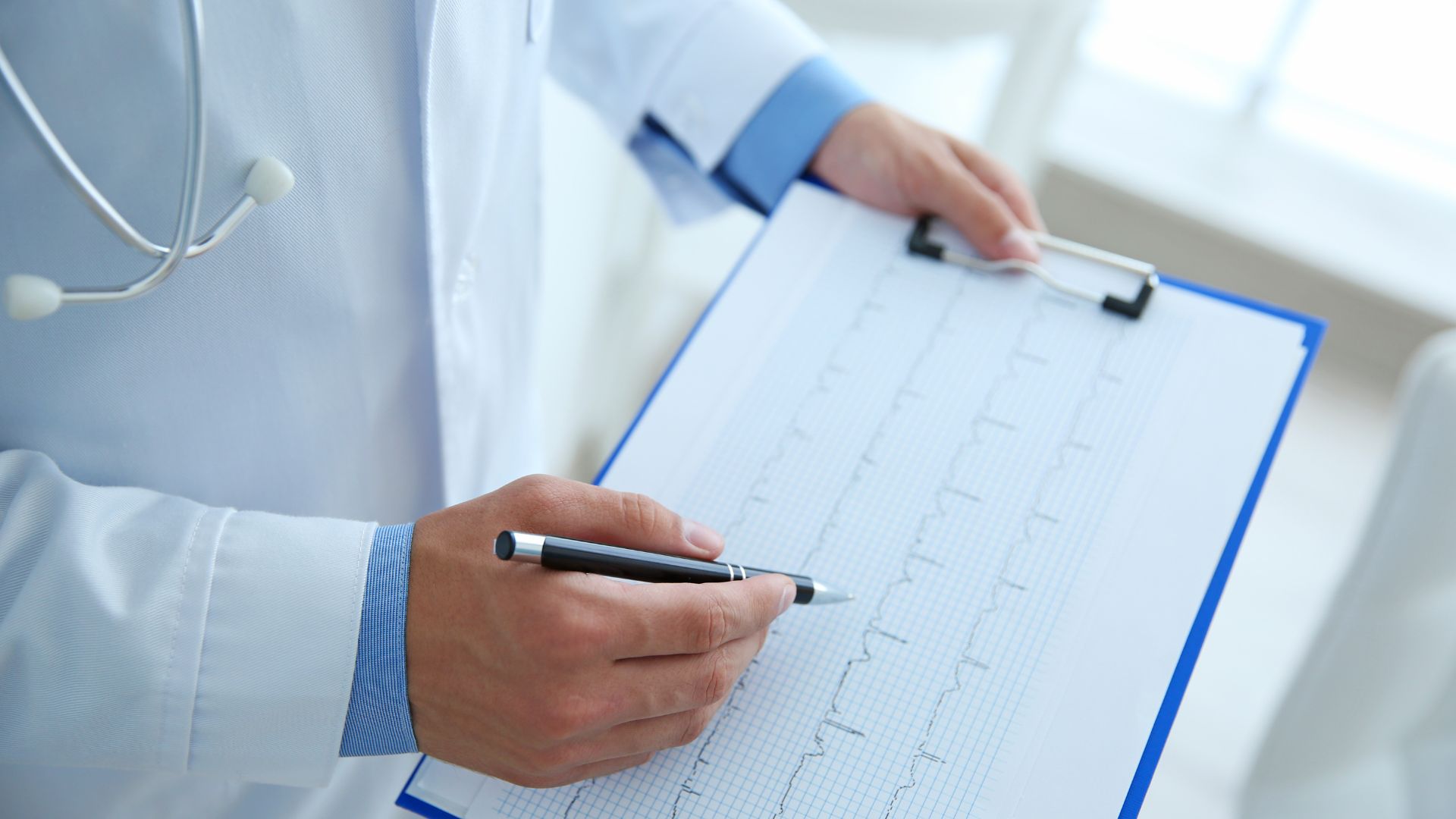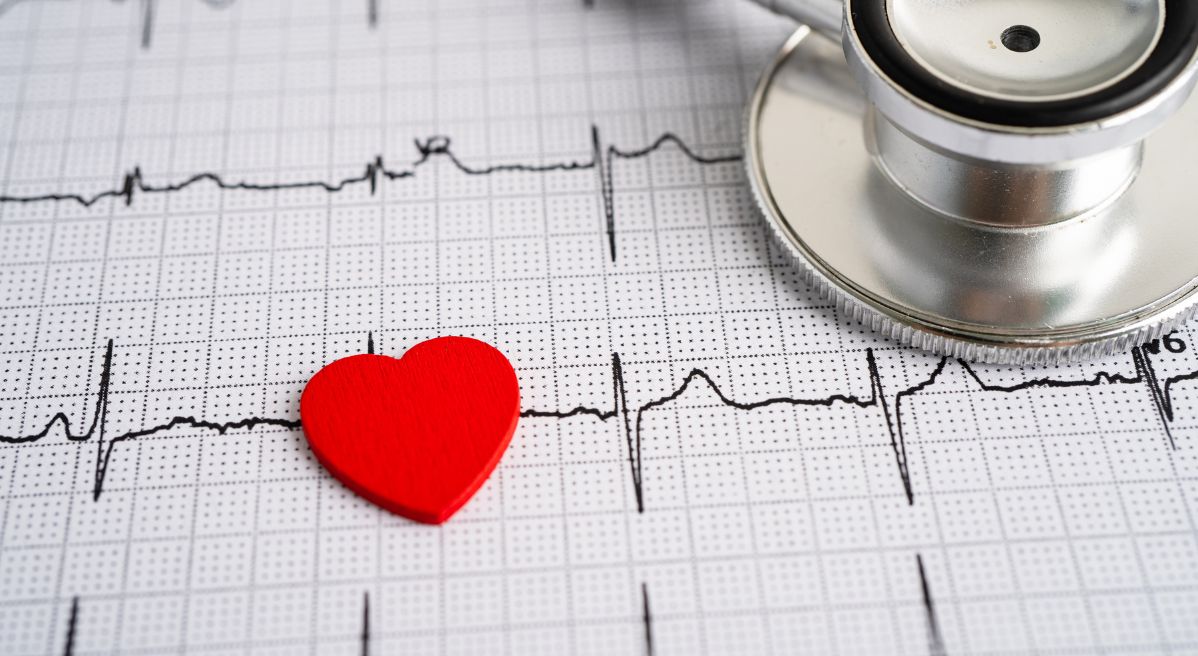How stress harms the heart
Emotional stress triggers a negative chain reaction in the body. If you are angry, upset, tense, frustrated, fearful, or depressed, your body’s natural response is to release stress hormones, including cortisol and adrenaline. These hormones are important in preparing the body to cope with stress, speeding up heart rate, increasing blood pressure, and raising blood sugar levels. As stress subsides, blood pressure and heart rate should return to normal. However, when a person is constantly under stress, the body doesn’t get a chance to recover. This can lead to damage to artery walls and other symptoms such as chest pain.
IMPORTANT: Any chest pain, especially recurring pain, requires a cardiology examination. PULSE Cardiology Center brings together cardiologists and interventional cardiologists who, with state-of-the-art diagnostic equipment, can provide a diagnosis within two hours.
Chest Pain and Shortness of Breath Due to Stress
When a person is upset, the action of adrenaline and cortisol immediately increases their heart rate and blood pressure. As a result, many people experience chest pain, sweating, a tightness or constriction in the chest on a nervous basis, or have difficulty breathing, feeling choked up due to stress. Sudden adrenaline surge can constrict the arteries in your heart and bind to cells within the heart. This condition, called stress cardiomyopathy, mimics a heart attack, from symptoms to changes in the electrical activity of the heart. Although stress cardiomyopathy is usually treated within a few days or weeks, it can lead to weakened heart muscle, congestive heart failure, and abnormal heart rhythms. Levels of adrenaline and cortisol do not return to normal in people with anxiety disorders.
Stress-Induced Arrhythmia
However, prolonged exposure to stress can contribute to rhythm disturbances (arrhythmias) such as atrial fibrillation. Stress and mental health problems can worsen the symptoms of atrial fibrillation. High levels of stress can also be associated with other health problems.
Chronic high levels of stress hormones can trigger a panic attack (causing symptoms very similar to a heart attack) and increase the risk of cardiovascular diseases.
IMPORTANT: If you experience a rapid heartbeat along with chest pain, difficulty breathing, shortness of breath, dizziness or confusion, fainting, seek medical help immediately. PULSE Cardiology Center has a Chest Pain Center that brings together eminent cardiologists, interventional cardiologists, and radiologists who will provide prompt care for the patient.
Skipping heartbeats and anxiety
Many people experience heart palpitations along with anxiety, feeling like their heart is skipping a beat, fluttering in the chest, neck, throat, and even in the ears. Anxiety triggers the “fight or flight” bodily response as part of the autonomic nervous system. When you feel uncomfortable in a situation, your defense mechanism can be activated, increasing the heart rate.
Although a rapid and strong heartbeat, known as palpitations, may seem alarming, it is generally not dangerous and subsides once the stressful situation that causes anxiety passes.
However, heart palpitations in some cases can be a sign of a serious health problem, such as an arrhythmia (heart rhythm disorder).
Anxiety can be associated with cardiac disorders and risk factors for the heart, such as:
- Rapid heartbeat (tachycardia) – In severe cases, it can interfere with normal heart function and increase the risk of sudden cardiac arrest.
- High blood pressure – if chronic, it can lead to coronary artery disease, weakened heart muscle, and heart failure.
- Reduced heart rate variability – can lead to a higher incidence of death after an acute heart attack
Distinguishing Panic Attacks from Heart Attacks
Panic attacks and heart attacks can have similar, if not identical, symptoms. Anyone who experiences sudden and intense chest pain – whether they are being treated for an anxiety disorder or not – should seek medical attention. The doctor will refer the patient for a blood test to check for specific cardiac muscle enzymes. Based on the results and examination, the cardiologist will be able to differentiate between symptoms of a panic attack and symptoms of a heart attack, and will be able to guide the patient towards treatment for panic disorder or any other type of anxiety.
Chest pain in a heart attack: Chest pain caused by a heart attack often radiates across the chest and extends to the shoulders, arms, and jaw. Chest pain from a heart attack starts slowly and gradually worsens.
Chest pain due to anxiety: The pain remains in the chest, and an anxiety attack causes sudden chest pain that slowly improves.
How does a doctor diagnose stress- and anxiety-induced heart palpitations?
The doctor first listens to the heart using a stethoscope and checks for any murmurs or other sounds. They will review the patient’s medical history, including their diet, smoking habits, excessive alcohol consumption, and whether they are being treated for any mental illness. They will also check if the patient has any thyroid problems or other health issues that can cause heart palpitations.
Depending on the examination, the cardiologist may recommend the following tests:
- Chest X-ray to examine the heart and lungs.
- Echocardiogram (ECHO) to assess the overall function of the heart.
- Electrocardiogram (EKG) to monitor the heart’s electrical activity.
- Holter monitoring to record the heart’s activity over a 24 to 48-hour period. If the Holter monitor does not show any abnormal heart rhythms during that time, the doctor may extend its use.
Based on the results obtained, the cardiologist determines the appropriate treatment or refers the patient to other specialized physicians.

How to protect your heart from stress
Every person can learn how to manage stress. Many people cope with stress in harmful ways, such as smoking, excessive drinking, and overeating. All of these unhealthy habits can contribute to the development of heart disease. However, adopting healthy habits will help you keep stress under control and better protect yourself from heart-related illnesses.
-Exercise. When you feel anxious and tense, exercise is an excellent way to burn off excess energy and stress. Go for a walk, ride a bike, swim, or go to the gym. Aim to engage in 150 minutes of moderate-intensity exercise or 75 minutes of vigorous-intensity exercise per week. You can exercise for 30 to 40 minutes, 4 to 5 days a week, to reduce stress and improve heart health.
-Eat healthier. Incorporate fresh fruits and vegetables into your diet, reduce or eliminate alcohol and caffeine consumption. The Mediterranean diet has been scientifically proven to benefit the heart.
-Deep breathing. Yoga is not only good for your body but also for your mind. Deep breathing practiced in yoga calms and relieves stress, especially when done regularly.
-Take a break from stressors. When your stress level rises, take a few minutes to escape from your surroundings. Spend a few quiet moments alone, read a short story, or listen to your favorite music.
-Focus on positive things. Make a gratitude list to shift your focus towards positive things. Surround yourself with friends. Social media is not a substitute for spending time with loved ones.
Exercise regularly and keep your emotional health in check, and you will build a stronger defense against heart diseases.
If you want to protect your heart from stress in the right way, you can seek advice at PULSE Cardiology Center. Highly experienced cardiologists specialized in the treatment and prevention of cardiovascular diseases will provide you with specific and useful guidance.






